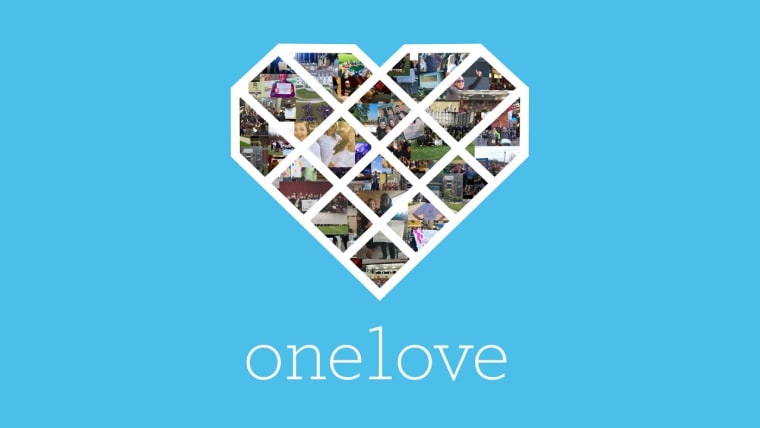According to the National Domestic Violence Hotline, “1 in 4 women and 1 in 7 men aged 18 and older in the U.S. have been the victim of severe physical violence by an intimate partner in their lifetime.”
And anyone who watches Dateline knows that domestic violence, or relationship abuse, is all too often at the heart of the cases we report on.
Because October is Domestic Violence Awareness Month, Andrea Canning sat down with the CEO of the One Love Foundation onthis week’s episode of Dateline: True Crime Weekly to learn more about recognizing the warning signs of an unhealthy relationship and what you can do if you think a loved one is experiencing relationship abuse.

In 2010, Julie Myers was a University of Virginia lacrosse coach when she lost one of her star athletes, Yeardley Love, to intimate partner violence. Since then, she has made it her mission to educate herself and others on the issue.
You can listen to the full episode now, for free.
Plus, read a transcript of their exchange below:
Andrea Canning: Julie, thank you for joining us.
Julie Myers: Thanks for having me.
Canning: Tell us a little bit about your organization, One Love. And I have a feeling I know how it got its name based on -- on your connection to this lacrosse player. So you can tell us. It was a very high profile case back in 2010.
Myers: May 3rd, 2010, as you mentioned, Yeardley Love, the player that the foundation is named for, lost her life at the hands of her ex-boyfriend. Um, we didn’t know what Yeardley was going through. We learned an awful lot in the court appearances that came afterwards and all the conversations. But there were lots of signs that we just didn’t recognize as signs. So our foundation focuses on teaching kids — youth from 11 to 24 — what the healthy behaviors are in a healthy relationship and the unhealthy behaviors in that unhealthy relationship. And really making sure that you can learn the difference, you can spot the signs. You know the signs. And then we teach kids how to have these really important conversations.
Canning: So, um, what are the signs that you should be looking out for, that this is perhaps more than just, you know, spats within a couple? That this is serious?
Myers: So, there are the 10 signs of healthy behaviors and 10 signs of unhealthy behaviors. And what you’re really looking for is — is there a pattern that’s escalating? The healthy signs would be: trust, honesty, independence, respect, equality, kindness, healthy conflict, comfortable pace, taking responsibility, and fun. On the flip side, the unhealthy behaviors. We have intensity, possessiveness, deflecting responsibility, manipulation, isolation, sabotage, belittling, guilting, volatility, and betrayal. And I would say every healthy relationship does some unhealthy things, for sure. But is that person taking responsibility? Are they accountable? Are they saying, “I am so sorry that I just looked at your phone when you didn’t want me to.” You know, “I am so sorry that I really made you do something that I wanted to do.”
Canning: Julie, what were some of the specific signs that you may have missed with Yeardley, or that some of her friends may have missed?
Myers: It started all-good. Very loving. You know, it was fun, supportive, encouraging. Um, and then it became a little bit possessive, probably in that last year, where he didn’t want Yeardley to be friends with other people. He certainly didn’t — they had broken up. Well, he certainly didn’t want Yeardley to date anybody else. Um, so I think that possessiveness, we just chalked up to, “It’s just how he is,” or, “It’s just when he drinks.” Like, I think we gave so much of what he did an excuse. My — my — my heartache is he had actually strangled her a few months earlier. He was mad that there was another gentleman that came to visit her from another school, um, and he found out and he went and he strangled her. I didn’t know that until after we lost her. But I don’t think anybody understood that she was now more likely to die at his hands.

Canning: I feel like, you know, for college students, teenagers, adults, I think the hardest part is when you do see that something might be wrong, it’s tough, because you don’t want to get in the middle of things all the time. How do you go against the grain and say, “No, you know what, I am going to say something”?
Myers: We say just be consistent and be there and be caring and talk about not the person or telling the person like, “You should break up.” But say, “Hey, when he doesn’t want you to come out with me, like, it — it hurts my feelings.” You know, “How does it make you feel?” So, you really make the person that you’re worried about see the behaviors through the emotions that it evokes. And nobody’s going to say, “You’re right,” the first time, and jump out of a relationship. But it’s like, “Hey, I’m here. If you want to talk today, I’ve got you. But if it’s tomorrow or next week, I’m here for you.”
Canning: One of the things that we’ve learned on Dateline, sadly, is that the most dangerous time can be when the person is trying to leave the relationship and they finally are doing it. Obviously, very important to have a safety plan in place before you cut things off.
Myers: Absolutely. We also encourage people to have — no matter how old you are — have friends you could turn to, your peers, have parents or trusted adults, that you could loop in and that you can ask for help and support, as well. Um, and, professionals. Um, there are amazing shelters and orgs that really help everybody with a safe place to stay, if — if you know to reach out to them. You’re never alone.
Canning: Absolutely. And we should say, Yeardley’s ex-boyfriend, George Huguely, was convicted of second degree murder in 2012 and is currently serving a 23-year sentence. He was also ordered to pay the Love family 15 million dollars in a civil suit back in 2022.
If you or someone you know is experiencing relationship abuse or domestic violence, a good place to go for advice and resources is the National Domestic Violence Hotline at 1-800-799-SAFE, 1-800-799-7233, or text START to 88788. Or go to thehotline.org.
Thank you so much, Julie, for joining us.
Myers: Thanks for having me.